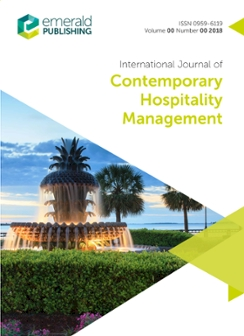Table of contents
Impact of the length of stay at hotels on online reviews
Jong Min Kim, Jeongsoo HanThe length of stay (LoS) is of major importance from the perspective of the management of tourist destinations. As tourists heavily rely on the online reviews of other travelers…
A hotel stay for a respite from work? Examining recovery experience, rumination and well-being among hotel and bed-and-breakfast guests
Chun-Chu Chen, Jiyoon (Jennifer) Han, Yao-Chin WangThis paper aims to examine the relationship among guests’ lodging recovery experience, work-related rumination, guest satisfaction and well-being, within the context of hotels and…
Consumers’ lodging intentions during a pandemic: empirical insights for crisis management practices based on protection motivation theory and expectancy theory
Alei Fan, Sheryl F. Kline, Yiran Liu, Karen ByrdDrawing on protection motivation theory (PMT) and expectancy theory, this study aims to investigate consumers’ lodging consumption intentions during a pandemic crisis.
Hotel experiences during the COVID-19 pandemic: high-touch versus high-tech
Dori Davari, Saeed Vayghan, SooCheong (Shawn) Jang, Mehmet ErdemThis study aims to gain an understanding of hotel experiences during the pandemic by examining sentiments of guests posted online.
The role of green HRM in driving hotels' green creativity
Paul Kivinda Muisyo, Qin Su, Hammad Bin Azam Hashmi, Thu Hau Ho, Mercy Muthoni JuliusEmployee green behavior can lead to a firm's green performance. However, green management research has not accorded adequate attention to the mechanism underlying green…
Is restaurant crowdfunding immune to the COVID-19 pandemic?
Yun (Yvonne) Yang, Yoon KohIn 2020, the COVID-19 pandemic had a devastating impact on global health care and the economy. The restaurant industry has been especially hit hard by the statewide “stay-at-home”…
The impact of AI-enabled service attributes on service hospitableness: the role of employee physical and psychological workload
Hailian Qiu, Minglong Li, Billy Bai, Ning Wang, Yingli LiHospitableness lies in the center of hospitality services. With the infusion of artificial intelligence (AI) technology in the hospitality industry, managers are concerned about…
The power of internet exposure: influence of online news coverage on restaurant survival
Hui Li, Qian-Xia Chen, Sai Liang, Jing-Jing YangFew studies on hospitality firm survival consider the impact of online media exposure. This paper aims to investigate how the online news coverage of restaurants, characterized in…
Information and communication technologies in food services and restaurants: a systematic review
Reyes Gonzalez, Jose Gasco, Juan LlopisInformation and communication technologies (ICTs) are a key player in the food services and restaurants sector; thus, the aim of this work consists in studying the previous…
Women in hospitality and tourism: a study of the top-down and bottom-up dynamics
Muhammad Ali, Mirit K. Grabarski, Alison M. KonradThis study aims to investigate the impact of women’s representation at one hierarchical level on women’s representation above or below that level. No past research investigated…
How CSR and well-being affect work-related outcomes: a hospitality industry perspective
Renata F. Guzzo, JéAnna Abbott, Minwoo LeeThe purpose of this study is to analyze how hospitality industry employees’ perceptions of corporate social responsibility (CSR) and participation in CSR activities influence…
Redefining luxury service with technology implementation: the impact of technology on guest satisfaction and loyalty in a luxury hotel
Hyejo Hailey Shin, Miyoung JeongTo explore the impact of luxury hotel brands’ technologies on guests’ perceived value enhancement and its consequences, this study aims to examine how task–technology fit (TTF…
Understanding tourists' memorable local food experiences and their consequences: the moderating role of food destination, neophobia and previous tasting experience
Frank Badu-Baiden, Seongseop (Sam) Kim, Honggen Xiao, Jungkeun KimThis study aims to test a new model by examining the influence of memorable local food consumption experiences (MLFCEs) on international diners’ affective states, well-being and…
Are employee assistance programs helpful? A look at the consequences of abusive supervision on employee affective organizational commitment and general health
I-An Wang, Hui-Ching Lin, Szu-Yin Lin, Pei-Chi ChenAbusive supervision has been a prevalent issue in the workplace. This study aims to explore the consequences of abusive supervision on employee affective organizational commitment…
Travel experience sharing on social media: effects of the importance attached to content sharing and what factors inhibit and facilitate it
Resat Arica, Cihan Cobanoglu, Onur Cakir, Abdülkadir Corbaci, Meng-Jun Hsu, Valentina Della CorteThis study aims to examine the factors influencing tourists to share their travel experiences on social media (SM).
Attracting Generation Z talents to the hospitality industry through COVID CSR practices
Jie Sun, Xi Yu Leung, Huiying Zhang, Kim WilliamsThis study aims to examine how COVID-related corporate social responsibility (CSR) activities affect future Generation Z employees’ intention to join the hotel industry through…
“A home away from hem”: exploring and assessing hotel staycation as the new normal in the Covid-19 era
Qi Yan, Huawen Shen, Yunhong HuEnlightened by the theoretical framework of adapted protection motivation, this study aims to explore and assess the viability and resilience of hospitality consumption in the…

ISSN:
0959-6119Online date, start – end:
1989Copyright Holder:
Emerald Publishing LimitedOpen Access:
hybridEditor:
- Prof Fevzi Okumus